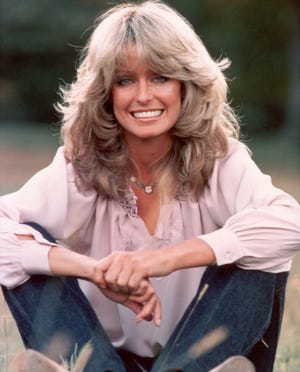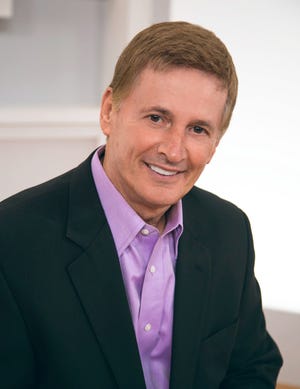
Why would Farrah Fawcett, the most famous “angel” and poster girl of all time, sell jewelry on TV?
In 1987, the actress did just that.
Her fame was still soaring then, and the Home Shopping Club in St. Petersburg wasn’t exactly the zenith of sophistication. But one of her friends suggested it, and replicas of Farrah’s own jewelry promised to be popular.
“I hope no one sees me doing this. My career will be over,” she confided to Bob Circosta, home shopping’s original host, before she went on air.
And that’s when Bob taught Farrah the ultimate secret to selling, which has worked on TV’s original home-shopping network, now called HSN or the Home Shopping Network, for 44 years:
It’s about communicating, not commerce.
It’s about helping, not hawking.
It’s about viewers, not you.

Farrah went on TV, flashed her big white teeth and sold out of her jewelry — because she stopped thinking of herself and started thinking of her viewers.
Would her earrings make them look smoking hot in a red swimsuit?
Oh, heck, no — but they might add sparkle on a rainy day. What’s wrong with that?
All of life’s a pitch, Bob might say. (In fact, “Life’s a Pitch” is the name of his 2014 book.)
If you’ve got a product the customer needs, and you can explain why she needs it, and you put your heart into it, you’ll be successful, Bob told Farrah.
“Live-streaming” retail pioneered by HSN and QVC, which merged in 2017 under the umbrella company Qurate Retail, works so well, new platforms like TikTok and Instagram are trying to copy the chatty information-plus-entertainment style of TV’s original home shopping channels.
Qurate’s earnings jumped 5 percent, to $14.2 billion, in 2020, boosted by the entire world staying home to hide from the COVID pandemic. With more people watching the folksy interaction between hosts, guests and celebrities pitching products, more people realized how home shopping has changed since its earlier, cornier days. Top brands — Estee Lauder cosmetics, Dooney & Bourke handbags, designer shoe brands such as Donald Pliner and Fly London — and star power from big names create a chummy atmosphere. It’s like Target meets Saks meets a coffee klatsch.
Celebrity’s top names see the value of the home-shopping fan club. Dolly Parton launched a perfume, Scent from Heaven, on HSN on Wednesday — and it promises to mirror the success of singer Mary J. Blige’s perfume launch in 2010, when the Grammy winner’s My Life fragrance sold 60,000 units in six hours of air time.
‘Billion dollar man’
Nobody knows more about selling on TV than Circosta, who’s called TV’s “billion-dollar man” because he’s sold products for 44 years and helped create the entire home-shopping business.
(Take that, Lee Majors! The actor, Fawcett’s husband at the time, starred in TV’s “Six Million Dollar Man.”)
Bob sold the first items ever sold on air — avocado green electric can openers. And he did this over the radio!
This was in 1977. Bob did a talk show on tiny WWQT in Clearwater from noon to 3 p.m., and station owner Bud Paxson sold advertising blocks to local stores. (Paxson later moved to Palm Beach County and started PAX-TV, which became the ION network. He died in 2015 at 79.)
When one store owner refused to pay his advertising bill because the ads weren’t generating sales, he told Paxson: “I just got some inventory. Grab a couple boxes there by the door, and if you can sell what’s in there, that’s my payment.”
Those can openers cranked open a whole new world of retail.
Bob interrupted his talk show to pitch the can openers. He sold 112 in one day. Soon, he went from pitching one product per day to an hour of products.
Imagine trying to sell a necklace or a piece of crystal on the radio! Bob and his cohort, Bobbi Ray Carter — TV shopping’s first woman host, who’s still selling on HSN — did just that.
It was such a small operation at the beginning that Bob would drop off the products to customers on his way home from work.
Bob and Bobbi knew most of their customers by name.
One shopper, Dolly, ended her call with the toot of a horn.
“What’s that noise?” Bob asked.
Turns out, Dolly was in a wheelchair, and she used a horn to summon help when she needed it. She just felt like ending her call with a friendly toot — and before you could say “beep beep,” the tooooooot from “Tootie the Horn” became home shopping’s welcome to callers.
Eventually, the home shopping world outgrew Tootie, but not the folksy vibe. (Bobbi Ray has the original Tootie horn, and she hauls it out on special occasions.)
Even with competition from online retailers like Amazon, home shopping works because it connects.
Bob still sells products on HSN. During the pandemic shutdown, he was often on air selling devices to measure the level of oxygen in blood.
Top salespeople share specific qualities, he says. “People relate to them. They’re people you want to have a cup of coffee with. They believe in what they’re doing, and they’re passionate about it,” he says. “That’s the element you can’t teach: passion.”
Every sale starts with a relationship, Circosta says. He recounts one of his favorite in his book: a shopper named Nancy called in to buy an exercise bike. She needed the bike to get back in shape after her pregnancy, she explained. In fact, she was calling from her hospital bed — while she was in labor!
Bob asked her how bad her labor pains were and how far apart. They talked about Lamaze breathing — Bob had just gone through this with his wife — and he even helped her with breathing exercises during a contraction. On the air!
Nancy chatted with Bob until he heard another voice say: “Gotta go!”
Click! Nancy hung up. But she had made such an impression that hundreds of viewers called the next day to see what happened to Nancy. Nancy’s mom called in to announce that Nancy had delivered a healthy baby boy — and named him “Robert.”
Bob lost it on the air as his happy tears flowed. He keeps in touch with Nancy and Robert to this day. That baby is now an advertising executive in Chicago.
He’s a natural-born salesman, of course!
